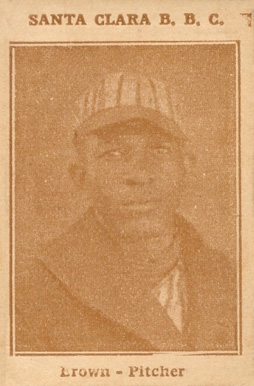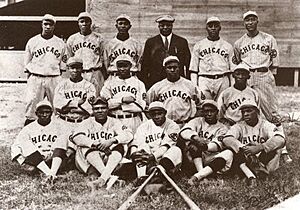Dave Brown (baseball) facts for kids
Quick facts for kids Dave Brown |
|||
|---|---|---|---|
 |
|||
| Pitcher | |||
| Born: June 9, 1895 Leon County, Texas |
|||
|
|||
| debut | |||
| 1917, for the Dallas Black Giants | |||
| Last appearance | |||
| 1926, for the Gilkerson's Union Giants | |||
| Negro league statistics | |||
| Win–loss record | 45–22 | ||
| Earned run average | 3.23 | ||
| Strikeouts | 336 | ||
| Teams | |||
|
|||
David Brown (born June 9, 1895) was a talented left-handed pitcher in Negro league baseball. He was known as one of the best pitchers in the history of the Negro leagues. His baseball career ended suddenly when he disappeared in 1925.
Contents
Early Baseball Days
Dave Brown was born in Leon County, Texas. He was a great pitcher with a strong curveball and excellent control. He was also a good fielder and very fast, but he wasn't a strong hitter.
Brown started his career playing for the Dallas Black Giants in 1917 and 1918. At first, people thought he was a quiet and kind person. However, he faced some legal issues during his time with the Dallas team. Despite this, Rube Foster, a very important figure in Negro league baseball, helped him. Foster paid a large sum of money to help Brown join his team, the Chicago American Giants.
Becoming a Star with the Chicago American Giants
Dave Brown quickly became the top pitcher, or "ace," for the Chicago American Giants. This team was one of the best in Negro league baseball in the early 1920s. From 1920 to 1922, he had an amazing record of 29 wins and only 8 losses in league games.
In 1921, his record of 11 wins and 3 losses helped his team win the pennant (championship). He even won three games in a special playoff against the Bacharach Giants. The next year, in 1922, his 8 wins and 3 losses helped the team win another pennant. During the winter after the 1922 season, Brown played in Cuba with the Santa Clara Leopardos team.
Moving Teams and a Sudden End
For the 1923 season, Dave Brown decided to leave Rube Foster's American Giants. He joined a new league called the Eastern Colored League and played for the New York Lincoln Giants. Rube Foster was not happy about this, as he had promised Brown's mother he would look after him.
Brown had a tougher first season with the Lincoln Giants. But he returned to Cuba that winter with teammate Oscar Charleston. They helped the Santa Clara team have one of the best seasons in Cuban baseball history. Brown's second season with the Lincoln Giants was much better. He helped his team win the New York City championship.
However, Dave Brown's baseball career ended very suddenly in 1925. He disappeared on April 27, 1925, after being out with some teammates.
What Happened Next?
The FBI looked for Dave Brown, but he was never officially seen again. Many rumors spread about what happened to him. Some people believed he kept playing baseball under a different name, "Lefty Wilson," for semi-professional teams in the central United States.
"Lefty Wilson" was said to have played for teams like Gilkerson's Union Giants in 1926. He also played for a white team in Bertha, Minnesota, in 1927 and 1928. There were also rumors he played in Sioux City, Iowa, in 1929 and Little Falls, Minnesota, in 1930. Some stories even claimed he died in mysterious ways in Denver, Colorado, in 1930. However, "Lefty Wilson" was reported to be pitching again for Gilkerson's Union Giants in 1932, and some reports said he was still alive in 1938.
His Legacy in Baseball
Even with his short career, Dave Brown is remembered as a great player. In 1927, a newspaper called the Pittsburgh Courier asked people to name the best black baseball player ever. John Henry Lloyd, a famous player himself, included Dave Brown on his list.
Later, in 1952, the Pittsburgh Courier made a similar list and again included Brown among the top players. If the Negro Leagues are considered major leagues, Dave Brown has one of the highest Adjusted ERA+ (a stat that compares a pitcher's performance to the league average) in baseball history. He also has one of the best winning percentages for a pitcher, with 62 wins and only 22 losses.
See also
- List of fugitives from justice who disappeared
 | Audre Lorde |
 | John Berry Meachum |
 | Ferdinand Lee Barnett |


